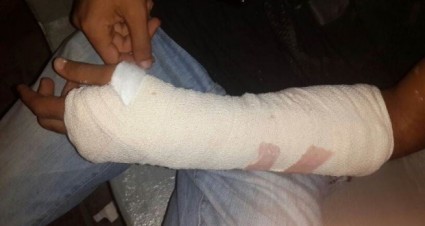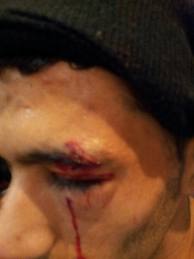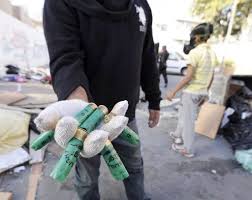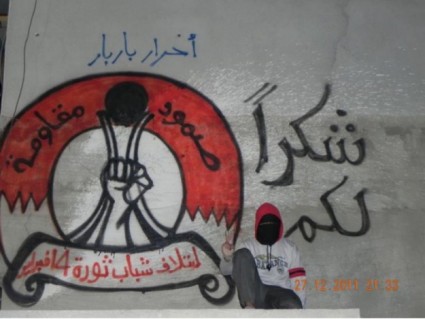Posts from — October 2013
Funeral for Yousif Ali al-Nashmi, Martyred by Torture, met with brutality and Weaponsized Tear Gas
Bahrain police fire tear gas at protesters
15 October, 2013 – ABNA
(Ahlul Bayt News Agency) – The demonstrators, who chanted slogans against the Al Khalifa regime, clashed with the forces as they were trying to march to the capital’s Pearl Square following the funeral of a prisoner on Saturday.
“The people want the downfall of the regime,” shouted the protesters.
According to witnesses, several protesters were injured in the clashes.
The funeral for Yousif Ali al-Nashmi, who died as he was in regime custody on Friday, was held in the western Manama suburb of Jidd Haf.
Since mid-February 2011, thousands of pro-democracy protesters have staged numerous demonstrations in the streets of Bahrain, calling for the Al Khalifa royal family to relinquish power.
On March 14, 2011, troops from Saudi Arabia and the United Arab Emirates invaded the country to assist the Bahraini government in its crackdown on the peaceful protesters.
According to local sources, scores of people have been killed and hundreds arrested.
Physicians for Human Rights says doctors and nurses have been detained, tortured, or disappeared because they have “evidence of atrocities committed by the authorities, security forces, and riot police” in the crackdown on anti-government protesters. …source
October 15, 2013 No Comments
Bahrain Court of Injustice moving travisty to tragedy – 214 People, 700 Years in September
Bahraini activists sentenced to 700 years in prison in September: report
09 October, 2013 – Tehran Times
According to a report released by al-Wefaq National Islamic Society, over the past month, Bahrain has seen the highest levels of violence used by the regime since the uprising began in 2011.
Al-Wefaq has documented 1,900 cases of human rights violations in a report only in the month of September, including incidents in which regime forces used excessive force or torture.
According to the report, last month, 214 anti-regime protesters were arrested, including two women and 40 children, the highest number since the revolution began.
The al-Wefaq report also said that 111 activists, who were convicted by a Bahraini court and given sentences of up to 15 years, were tried based on fabricated charges, Press TV reported.
On Monday, Bahrainis took to the streets in the northeastern island of Sitra for the sixth consecutive day to denounce the regime’s unrelenting crackdown on pro-democracy protests.
People from all walks of life attended marches in Sitra to demand reforms and an end to the decades-old rule of the Al Khalifa dynasty.
Earlier in the day, a court in Bahrain sentenced nine anti-regime activists to life in prison after convicting them of being allegedly involved in an attack in November 2011 in the capital Manama.
Four of the defendants, who were present at the court, had previously said that they were subjected to torture and mistreatment in solitary confinement.
Five other defendants, tried in absentia, were handed additional 10-year jail terms for failing to hand themselves in.
The verdict brought to 104 the number of pro-democracy protesters sentenced to lengthy jail terms in Bahrain.
Similar rallies were also held in the villages of Nuwaidrat and Samahich close to Sitra, where protesters expressed solidarity with the detainees and condemned the unjust sentences.
Since mid-February 2011, thousands of pro-democracy protesters have staged numerous demonstrations in the streets of Bahrain, calling for the Al Khalifa royal family to relinquish power.
According to local sources, scores of people have been killed and hundreds arrested.
Physicians for Human Rights says doctors and nurses have been detained, tortured, or disappeared because they have “evidence of atrocities committed by the authorities, security forces, and riot police” in the crackdown on anti-government protesters. …source
October 10, 2013 No Comments
SHOUT OUT for the CUNY Protesters – Drop the Charges NOW
Petition: Drop the Charges Against CUNY Protesters
The NYPD violently arrested six CUNY students protesting David Petraeus’ new professorship at the Honors College, and charged them with disorderly conduct, riot, resisting arrest and obstruction of governmental administration, for which they could face serious jail time. Video obtained by Firedoglake’s Dissenter blog shows their use of force was completely unprovoked.
Can you please sign the following petition asking Manhattan District Attorney Cyrus Vance Jr. to drop all charges against the students? PETITION HERE
Students and faculty at the City University of New York have the constitutional right to engage in peaceful protest against David Petraeus’ professorship at the Honors College. Recent video of NYPD officers engaging in outrageous and abusive acts of force against these protesters cannot go unchallenged. We, the undersigned, demand all charges against these individuals be dropped immediately and for the arresting officers be investigated for their conduct immediately.
October 10, 2013 No Comments
Facts about CIA Extraordinary Rendition and Secret Detention
20 Extraordinary Facts about CIA Extraordinary Rendition and Secret Detention
5 February, 2013 – by Jonathan Horowitz & Stacy Cammarano – Open Society Justice Initiative
After the 9-11 attacks against the United States, the Central Intelligence Agency conspired with dozens of governments to build a secret extraordinary rendition and detention program that spanned the globe. Extraordinary rendition is the transfer—without legal process—of a detainee to the custody of a foreign government for purposes of detention and interrogation.
The program was intended to protect America. But, as described in the Open Society Justice Initiative’s new report, it stripped people of their most basic rights, facilitated gruesome forms of torture, at times captured the wrong people, and debased the United States’ human rights reputation world-wide.
To date, the United States and the vast majority of the other governments involved—more than 50 in all—have refused to acknowledge their participation, compensate the victims, or hold accountable those most responsible for the program and its abuses. Here are 20 additional facts from the new report that expose just how brutal and mistaken the program was:
1. At least 136 individuals were reportedly extraordinarily rendered or secretly detained by the CIA and at least 54 governments reportedly participated in the CIA’s secret detention and extraordinary rendition program; classified government documents may reveal many more.
2. A series of Department of Justice memoranda authorized torture methods that the CIA applied on detainees. The Bush Administration referred to these methods as “enhanced interrogation techniques.” “Enhanced interrogation techniques” included “walling” (quickly pulling the detainee forward and then thrusting him against a flexible false wall), “water dousing,” “waterboarding,” “stress positions” (forcing the detainee to remain in body positions designed to induce physical discomfort), “wall standing” (forcing the detainee to remain standing with his arms outstretched in front of him so that his fingers touch a wall five four to five feet away and support his entire body weight), “cramped confinement” in a box, “insult slaps,” (slapping the detainee on the face with fingers spread), “facial hold” (holding a detainee’s head temporarily immobile during interrogation with palms on either side of the face), “attention grasp” (grasping the detainee with both hands, one hand on each side of the collar opening, and quickly drawing him toward the interrogator), forced nudity, sleep deprivation while being vertically shackled, and dietary manipulation.
3. President Bush has stated that about a hundred detainees were held under the CIA secret detention program, about a third of whom were questioned using “enhanced interrogation techniques.”
4. The CIA’s Office of Inspector General has reportedly investigated a number of “erroneous renditions” in which the CIA had abducted and detained the wrong people. A CIA officer told the Washington Post: “They picked up the wrong people, who had no information. In many, many cases there was only some vague association” with terrorism.
5. German national Khaled El-Masri was seized in Macedonia because he had been mistaken for an Al Qaeda suspect with a similar name. He was held incommunicado and abused in Macedonia and in secret CIA detention in Afghanistan. On December 13, 2012, the European Court of Human Rights held that Macedonia had violated El-Masri’s rights under the European Convention on Human Rights, and found that his ill-treatment by the CIA at Skopje airport in Macedonia amounted to torture.
6. Wesam Abdulrahman Ahmed al-Deemawi was seized in Iran and held for 77 days in the CIA’s “Dark Prison” in Afghanistan. He was later held in Bagram for 40 days and subjected to sleep deprivation, hung from the ceiling by his arms in the “strappado” position, threatened by dogs, made to watch torture videos, and subjected to sounds of electric sawing accompanied by cries of pain.
7. Several former interrogators and counterterrorism experts have confirmed that “coercive interrogation” is ineffective. Col. Steven Kleinman, Jack Cloonan, and Matthew Alexander stated in a letter to Congress that that U.S. interrogation policy “came with heavy costs” and that “[k]ey allies, in some instances, refused to share needed intelligence, terrorists attacks increased world wide, and Al Qaeda and like-minded groups recruited a new generation of Jihadists.”
8. After being extraordinarily rendered by the United States to Egypt in 2002, Ibn al-Shaykh al-Libi, under threat of torture at the hands of Egyptian officials, fabricated information relating to Iraq’s provision of chemical and biological weapons training to Al Qaeda. In 2003, then Secretary of State Colin Powell relied on this fabricated information in his speech to the United Nations that made the case for war against Iraq.
9. Abu Zubaydah was waterboarded at least 83 times by the CIA. FBI interrogator Ali Soufan testified before Congress that he elicited “actionable intelligence” from Zubaydah using rapport-building techniques but that Zubaydah “shut down” after he was waterboarded.
10. Torture is prohibited in all circumstances under international law and allegations of torture must be investigated and criminally punished. The United States prosecuted Japanese interrogators for “waterboarding” U.S. prisoners during World War II.
11. On November 20, 2002, Gul Rahman froze to death in a secret CIA prison in Afghanistan called the “Salt Pit,” after a CIA case officer ordered guards to strip him naked, chain him to the concrete floor, and leave him there overnight without blankets.
12. Fatima Bouchar was abused by the CIA, and by persons believed to be Thai authorities, for several days in the Bangkok airport. Bouchar reported she was chained to a wall and not fed for five days, at a time when she was four-and-a-half months pregnant. After that she was extraordinarily rendered to Libya.
13. Syria was one of the “most common destinations for rendered suspects,” as were Egypt and Jordan. One Syrian prison facility contained individual cells that were roughly the size of coffins. Detainees report incidents of torture involving a chair frame used to stretch the spine (the “German chair”) and beatings.
14. Muhammed al-Zery and Ahmed Agiza, while seeking asylum in Sweden, were extraordinarily rendered to Egypt where they were tortured with shocks to their genitals. Al-Zery was also forced to lie on an electrified bed frame.
15. Abu Omar, an Italian resident, was abducted from the streets of Milan, extraordinarily rendered to Egypt, and secretly detained for fourteen months while Egyptian agents interrogated and tortured him by subjecting him to electric shocks. An Italian court convicted in absentia 22 CIA agents and one Air Force pilot for their roles in the extraordinary rendition of Abu Omar.
16. Known black sites—secret prisons run by the CIA on foreign soil—existed in Afghanistan, Lithuania, Morocco, Poland, Romania, and Thailand.
17. Abd al Rahim al Nashiri was secretly detained in various black sites. While secretly detained in Poland, U.S. interrogators subjected al Nashiri to a mock execution with a power drill as he stood naked and hooded; racked a semi-automatic handgun close to his head as he sat shackled before them; held him in “standing stress positions;” and threatened to bring in his mother and sexually abuse her in front of him.
18. President Obama’s 2009 Executive Order repudiating torture does not repudiate the CIA extraordinary rendition program. It was specifically crafted to preserve the CIA’s authority to detain terrorist suspects on a short-term, transitory basis prior to rendering them to another country for interrogation or trial.
19. President Obama’s 2009 Executive Order also established an interagency task force to review interrogation and transfer policies and issue recommendations on “the practices of transferring individuals to other nations.” The interagency task force report was issued in 2009, but continues to be withheld from the public. It appears that the U.S. intends to continue to rely on anti-torture diplomatic assurances from recipient countries and post-transfer monitoring of detainee treatment, but those methods were not effective safeguards against torture for Maher Arar, who was tortured in Syria, or Ahmed Agiza and Muhammed al-Zery, who were tortured in Egypt.
20. The Senate Select Intelligence Committee has completed a 6,000 page report that further details the CIA detention and interrogation operations with access to classified sources. However, the report itself remains classified.
October 10, 2013 No Comments
Obama Sustains Extraordinary Rendition with Kidnap of Former US Agent in Libya
The United-States abduct one of their ex-agents in Libya
Voltaire Network – 10 October, 2013
President Obama gave the order to abduct Abu Anas al-Libi (a.k.a Nazih Abd al-Hamid al-Ruqhay), on October 6th 2013 in Libya. A team of the Delta Force succeeded without making any victims.
Even supposing that al-Libi is a legitimate target for the US, as said by the Secretary of State John Kerry, this kidnapping constitutes a violation of international law and of Libyan sovereignty.
In 1995, the jihadist, having joined Osama Bin Laden in Soudan, had participated in an failed attempt to assassinate the Egyptian president, Hosni Moubarack. He then took refuge in Doha (Qatar).
In 1996, the english secret services (MI5 and MI6) financed an Al-Qaïda cell to assassinate the Libyan leader Mouammar el-Kadhafi [1]. Anas Al-Libi played the intermediary in the transaction and this way received political asylum in the UK. He lived in Manchester until he was charged, in 2000, by the US.
In 2000, he was accused, by the South District Court of New York, of having proceeded in 1993 in photographic reconnoitring that would have enabled, five years later, the attacks on the US embassies of Daar es-Salam and Nairobi, on the 7th of August 1998, killing 12 americans (and incidently 214 other people, in a total of 5 000 non-american injured). When the List of the most wanted suspects by the FBI was created in 2001, a 5 million dollar reward was offered for his capture.
Various sources claim that he was detained in Iran from 2003 to 2012, at which date he returned to Libya. However, on the 6th of June 2007, Amnesty International claimed that he was actually detained in a secret CIA prison [2].
In December 2010, the Libyan representative at the UN indicated that Al-Libi and his family had returned to their country, as part of a negotiated peace treaty by Saif el-Islam Kadhafi, under US surveillance. With other members of Al-Qaïda and under Abdelhakim Belhaj’s authority [3], he participates, starting February 2011 (three months later) in NATO’s operations in Libya, leading to the Jamahiriya’s overthrowing and to Mouammar el-Kadhafi’s lynching. One of al-Libi’s son’s is killed in retaliation by the nationalists in October 2011.
Kidnapped by the US Secretary of Defence in Tripoli (Lybia) on October 6th 2013, Abu Anas al-Libi was, according to the New York Times, transferred aboard USS San Antonio, in the Mediterranean sea, to be interrogated [4] outside of the US penal system’s protection [5]. He could eventually be handed over to the US justice in a few weeks or months.
USS San Antonio is a landing ship, and it’s holds have been transformed into a secret prison by the US Navy. The detainees are interrogated according to a special techniques program by Dr. Martin Seligman [6]. The goal is not to obtain information, but to condition the victims. Officially, president Barack Obama has closed these secret prisons and forbidden torture.
The United-States have not yet claimed the abduction, contrary to international law since Ahmed Abdulkadir Warsame’s abduction on April 19th 2011 (which was made public two months later).
…source
October 10, 2013 No Comments
Bahrain Courts of Injustice – 18 convicted, imprisoned with torture coerced confessions
Bahrain jails 18 men for police station attack
10 October,2013 – Arab News
DUBAI: A Bahraini court on Thursday sentenced 18 men to between five and seven years in prison after they were convicted of attacking a police station, a judicial source said.
Fifteen defendants were jailed for seven years and three for five years after being of attacking the police station in a Shiite village near Manama last November.
They had been charged with “aggression” against police, “possession of petrol bombs” and taking part in an unauthorized protest “aiming at undermining public security.”
No casualties were reported in the attack.
Thursday’s ruling brings to 122 the number of people jailed since September 29 in connection with violence in the kingdom that began in February 2011 with a month-long uprising.
In August, King Hamad decreed stiffer penalties for “terror acts.”
These include a minimum 10-year jail term for an attempted bombing. If such attacks cause casualties, the sentence can be life imprisonment or the death penalty.
Bahraini activists continue to demonstrate in villages outside the capital and frequently clash with police.
At least 89 people have been killed since the protests began two and a half years ago, according to the International Federation for Human Rights.
Strategically located across the Gulf from Iran, Bahrain is home to the US Navy’s Fifth Fleet and is an offshore financial and services center for its oil-rich Arab neighbors.
October 10, 2013 No Comments
Bahrain’s Street Defenders Hold Regime’s Violent, Thieving, Rapacious Police Thugs at Bay
Article 12 Universal Declaration of Human Rights states:
No one shall be subjected to arbitrary interference with his privacy, family, home or correspondence, nor to attacks upon his honour and reputation. Everyone has the right to the protection of the law against such interference or attacks.
Bahrain forces assault child
Al Wefaq – 8 October, 2013
Bahrain regime forces have assaulted a minor during a patrol round in a residential area. According to his family, the area wasn’t witnessing any demonstrations at the time. The forces beat the boy and caused a fracture in his hand and injuries in different parts of his body.
The incident reflects the barbarian and terrorizing behavior of the regime’s mercenary forces in dealing with children and the citizens in general.
October 9, 2013 No Comments
Psychiatrists Deeply Concerned For 5% Of Americans Who Approve Of Congress
Psychiatrists Deeply Concerned For 5% Of Americans Who Approve Of Congress
9 October, 2013 – The Onion
WASHINGTON—Noting that the individuals in question may be extremely mentally disturbed or suffering from a serious psychological illness, the nation’s psychiatrists announced Wednesday that they are deeply concerned for the estimated 5 percent of Americans who were found in nationwide polls this week to approve of the U.S. Congress. “With numerous members of Congress refusing to negotiate an end to the shutdown in the face of widespread federal furloughs and a looming deadline to avoid defaulting on government debt, we are extremely concerned for the mental health of those Americans who responded, ‘Yes, we think Congress is doing a good job,’” psychiatrist Dr. Donald Levin said in a press conference this morning.
Dr. Donald Levin, told reporters that the estimated 15.5 million Americans who approve of Congress are likely “very troubled” citizens who may in fact be experiencing psychotic episodes or delusional thoughts. “We’re not entirely sure who these people are or where they come from—perhaps they are psych ward patients, or unstable recluses living in remote huts on the outskirts of society—but what we do know is that they are extremely disconnected from reality and in need of immediate attention if they are not already receiving it. We need to find these people and get them the help they need before their illnesses get worse.”
Psychiatrists added that because a number of mental health services are currently furloughed, many respondents would just have to “sit tight and hang in there” until the shutdown is resolved. …source
October 9, 2013 No Comments
Saudis stretched to cope with waning US dominance in Middle Eastern Affairs
Insight: Saudis brace for ‘nightmare’ of US-Iran rapprochement
9 October, 2013 – Egypt Independent – Reuters
When Saudi Arabia’s veteran foreign minister, Prince Saud al-Faisal, made no annual address to the United Nations General Assembly last week for the first time ever, his unspoken message could hardly have been louder.
For most countries, refusing to give a scheduled speech would count as little more than a diplomatic slap on the wrist, but for staid Saudi Arabia, which prefers back-room politicking to the public arena, it was uncharacteristically forthright.
Engaged in what they see as a life-and-death struggle for the future of the Middle East with arch-rival Iran, Saudi rulers are furious that the international body has taken no action over Syria, where they and Tehran back opposing sides.
Unlike in years past, they are not only angry with permanent Security Council members China and Russia, however, but with the United States, which they believe has repeatedly let down its Arab friends with policies they see as both weak and naive.
Like Washington’s other main Middle Eastern ally, Israel, the Saudis fear that President Barack Obama has in the process allowed mutual enemies to gain an upper hand.
The alliance between the United States, the biggest economy and most powerful democracy, and Saudi Arabia, the Islamic monarchy that dominates oil supplies, is not about to break.
But, as happened 40 years ago next week when an OPEC oil embargo punished US war support for Israel, Riyadh is willing – albeit without touching energy supplies – to defy Washington in defense of its regional interests. The two have been at odds over Egypt since the Arab Spring, and increasingly so on Syria, where Saudi Arabia could now do more to arm Sunni Muslim rebels.
The real focus of Saudi anger is the Shi’ite Muslim clerics who have preached Islamic revolution since coming to power in Tehran 34 years ago, and whose hands Riyadh sees orchestrating political foes in half a dozen Arab countries.
Already aghast at US reluctance to back rebels fighting Syrian President Bashar al-Assad, Tehran’s strongest Arab friend, Saudi princes were horrified to see Washington reaching out to Hassan Rouhani, the new Iranian president, last month.
“The Saudis’ worst nightmare would be the administration striking a grand bargain with Iran,” said former diplomat Robert Jordan, who was US ambassador to Riyadh from 2001 to 2003.
Although any meaningful US-Iranian rapprochement looks distant, Obama telephoned Rouhani, an emollient self-described moderate, during the United Nations General Assembly.
The Saudis now fear Obama may be tempted to thaw ties with Tehran by striking a deal to allow inspections of its atomic sites in return for allowing Iranian allies to go on dominating Arab countries such as Lebanon, Syria and Iraq. That such a bargain has never been publicly mooted from within the Obama administration has not stopped Saudis voicing their concerns.
“I am afraid in case there is something hidden,” said Abdullah al-Askar, chairman of the foreign affairs committee in Saudi Arabia’s advisory parliament, the Shoura Council. “If America and Iran reach an understanding it may be at the cost of the Arab world and the Gulf states, particularly Saudi Arabia.”
Askar stressed he was not privy to government thinking on the issue and was speaking in a purely personal capacity. …more
October 9, 2013 No Comments
After Obama’s ‘near miss’ on Syria, Brits step away from incoherent US Foreign Policy
Iran, Britain Agree to Name Non-Resident Diplomats
9 October, 2013 – FARS
TEHRAN (FNA)- Iran and Britain have agreed to appoint non-resident charges d’affaires as a first step towards reopening of embassies, Iranian Foreign Ministry Spokeswoman Marziyeh Afkham said.
“Following negotiations between the two foreign ministers in New York, it has been agreed that talks shall continue between representatives of the two foreign ministries,” Afkham said on Tuesday.
“And following these talks, British Foreign Secretary William Hague, in a telephone conversation with (Iranian Foreign Minister Mohammad Javad) Zarif yesterday (Monday), proposed that the two countries move to appoint non-resident chargés d’affaires in their respective capitals,” she added, press tv reported.
In a meeting at the UN Headquarters in New York City on September 23, Zarif and Hague discussed the improvement of Tehran-London relations, Iran’s nuclear energy program as well as regional developments.
Afkham said in view of the Iranian parliament’s approval of a bill to downgrade Iran-UK ties, Tehran and London agreed to maintain ties at the level of non-resident chargés d’affaires as of Tuesday.
On November 27, 2011, Iranian lawmakers voted by a large majority to downgrade diplomatic ties with the United Kingdom, in response to Britain’s decision to impose sanctions on the Central Bank of Iran over the allegation that Iran is pursuing non-civilian objectives in its nuclear energy program.
Two days after the decision by the Iranian parliament, hundreds of Iranian students staged a protest outside the British Embassy in Tehran and pulled down the UK flag.
On November 30 of the same year, London cut off its ties with Tehran, withdrew its diplomatic staff from Iran and the Iranian Embassy in London was closed. …source
October 9, 2013 No Comments
The Saudi-Bahrain Sectarian Divide, is an Engineered Apartheid
The Sectarian Gulf vs. the Arab Spring
By Toby Matthiesen – 8 October, 2013 – FP, Foreign Policy
I first visited the Eastern Province in 2008 while on a fieldwork trip. Traveling on a railroad built by the Americans for King Abdulaziz al Saud, the founder of the modern Kingdom of Saudi Arabia, as a favor in return for the right to explore Saudi oil reserves, I left the shiny skyscrapers and crowded streets of the capital Riyadh and arrived in Hofuf in the al-Ahsa oasis, which together with Qatif is the main center of Shiite settlement in Saudi Arabia. In these towns and surrounding villages, some side streets have no pavement, old city centers are decaying, and youth unemployment is high. For decades, Shiites have also complained of sectarian discrimination in religious practices, government employment, and the judicial system, all of which contributes to the feeling that they are being treated like second-class citizens.
When faced with rising political challenges in early 2011, the Gulf states — Bahrain and Saudi Arabia in particular — mobilized sectarianism in order to suppress domestic calls for reform, a strategy that I analyze in my recent book Sectarian Gulf: Bahrain, Saudi Arabia, and the Arab Spring that Wasn’t. I saw first-hand how the invention of a “Shiite threat” narrative unfolded, standing on the now demolished Pearl Roundabout in the Bahraini capital Manama in mid-February 2011. Initially, tens of thousands, mainly Shiite (but also some Sunni), protesters poured into the streets to demand political reform. After the first protesters were shot, a part of the protest movement became radicalized, and started calling for the removal of the ruling family. Bahrain has a Shiite majority population (between 60 and 70 percent) and the ruling family is Sunni, so the ruling family used official and semi-official media to try to portray this as a “sectarian” uprising of one sect against the other.
Just as President Bashar al-Assad is doing in Syria, this strategy of sectarian polarization was aimed at delegitimizing the opposition, and scaring the minority Sunnis of a possible alternative political system and into total allegiance with the ruling family. A month after the protests started, on March 14, 2011, Saudi troops rolled over the causeway that links the Saudi Eastern Province with Bahrain. The king of Bahrain imposed a state of emergency, and a campaign of arrests, torture, mass dismissals and extrajudicial killings started, mainly directed against members of the Shiite sect.
At the same time, the Saudi media empire, which controls much of the pan-Arab media, started taking up the Bahraini narrative and accused all the Shiites in the Gulf states of planning an uprising at the behest of Iran. This narrative was as much directed against the Bahraini Shiites, as against the Saudi Shiites, of whom there are between two and three million mainly concentrated in the oil-rich Eastern Province. Galvanized by the Bahrain uprising, they started a protest movement of their own, and were the only Saudis to go out into the streets when social media sites called for a Saudi chapter of the region-wide Arab Spring in March 2011. Other Saudis have since taken to the streets to demand the release of political prisoners but by and large the protest movement in the Eastern Province failed to spill over to the rest of the country.
Rather than addressing the real grievances of their Shiite citizens or instituting some political reform, as the Bahraini protesters were demanding, the Gulf states reacted with an “iron fist,” as the Saudi Ministry of Interior put it. They spearheaded the regional counter-revolution and spread a vicious sectarian hate speech that would shape the discourse and actions of the rebels in Syria, while preventing Shiites and Sunnis at home from uniting in calls for reform. The Gulf countries’ demonization of the Shiites has led to a virtual “sectarian Gulf.” Local Shiites (and foreign Shiites such as Lebanese or South-East Asians) are collectively marginalized and brandished as a fifth column. This has led to a breakdown of the cross-sectarian social fabric in the Gulf and beyond, with many Sunni Islamists from the Gulf funding the rebels in Syria, while the loyalties of many Gulf Shiites lie with the Assad regime and Hezbollah. Syria has then become a locus for yet another proxy-conflict, one that sets a dangerous precedent for Sunni-Shiite relations in the Gulf and beyond.
If the Gulf states are really concerned about the loyalty of their Shiite subjects, they should accept them as full and equal citizens. The current policy of stigmatization and collective punishment is alienating many Gulf Shiites and is driving small groups of opposition activists back into the Iranian nexus, a connection that had existed after the Iranian Revolution of 1979 but had been largely capped since most Gulf Shiite oppositionists returned from exile throughout the 1990s. While Iran does not have the kind of influence over Gulf Shiite political movements it had in the 1980s, and the Shiites in the Gulf do not protest because of affinity with Iran, there are signs that Iran and Lebanon’s Hezbollah are again trying to reach out to Bahraini and Saudi Shiite opposition activists. A realignment of some Gulf Shiite opposition groups with Iran or Shiite militias across the region would come as a response to the Gulf states’ sectarian counter-revolution and their vicious crackdown on any form of dissent. This would be a self-fulfilling prophecy that should be avoided.
The Gulf states’ sectarian strategy also puts a new light on the Gulf’s shifting relationship with political Islam and its support for the crackdown on the Muslim Brotherhood in Egypt. While popular wisdom usually sees the Gulf states as promoters of political Islam, they have a very ambiguous relationship with Islamist movements across the Middle East, and apart from Qatar, no Gulf state is backing the main Arab Sunni Islamist group, the Muslim Brotherhood, unconditionally. Some Gulf states were the main supporters of the recent military coup against the Muslim Brotherhood-dominated government: Saudi Arabia, the United Arab Emirates, and Kuwait immediately pledged $12 billion of aid to the new government. This was, in part, because the Brotherhood and its Qatari backers did not fit comfortably into the anti-democratic and sectarian agenda that these regimes view as essential to their own survival. The rise of an alternative Sunni Islamic model of politics was to be avoided at all costs and the hate speech directed against supporters of the Muslim Brotherhood both in Egypt and in the Gulf, denouncing them as the enemy within, is similar to the hate speech directed against the Shiites.
But if the Gulf states are serious about long-term stability in the region, they should enable the inclusion of pro-democracy Islamic movements in the political process both at home and in the wider region. The West should not again pick sides in these intra-Islamic feuds (the intervention in Iraq in 2003 was one of the key events that paved the way for the current sectarian polarization). Rather than backing Sunni Islamist rebels in Syria and buying into the “Shiite threat” narrative emanating from Gulf capitals, the West should urge its allies in the Gulf to tame down sectarian rhetoric and negotiate a new social contract. Barring that, the sectarian civil war that is now effectively stretching from Beirut to Basra may come back to haunt the Gulf states and their Western supporters.
October 9, 2013 No Comments
Bahrain State Terror leaves PM bin Salman’ call to reject violence a fools utterace

Bahrain Protestor Bird-shot by Riot Police during Recent Village Raids, Round-up and Detention
HRH Premier: Whoever abstains from rejecting violence is not eligible to talk about reform
9 October, 2013 – BNA
Manama, Oct. 9. (BNA) – His Royal Highness Prime Minister Prince Khalifa bin Salman Al Khalifa has urged all government departments to take the necessary measures to implement the recommendations issued by the National Assembly and apply the law strictly and firmly.
He stressed that in line with the Royal desire and the will of the people of Bahrain, state departments have no other option but to implement the recommendations “directly and immediately” so that every citizens feels secure in his daily life.
This came as HRH Premier chaired here today a security and civil meeting in which he reviewed the security situation in the kingdom, especially regarding combating terrorism.
He emphasised that violence, terrorism and involvement in providing cover for groups of saboteurs who aim to undermine the kingdom’s security, stability and hard-won achievements cannot, as proved throughout history, create a reform-friendly environment.
Embracing violence, adopting political sectarianism and resorting to foreign sides can only lead to an environment that is hostile to reform and real progress, he explained.
HRH Premier stressed that whoever abstains from renouncing violence and repudiating perpetrators openly and firmly is not eligible enough to talk about reform, democracy and serious desire to bring about real development.
He pointed out that whoever rejects national consensus and engages in some practices to exert pressure in order to earn narrow gains lacks seriousness, will to enhance all-inclusive national work and credibility.
HRH Prime Minister affirmed that the government has the right to ensure that all sides, including political associations, adhere to the laws regulating political work in the kingdom.
He stressed that practising political work transparently and according to legal norms is a basic requirement in order to ensure its legitimacy and protect its principles. ..source
October 9, 2013 No Comments
Lebanese Politicians Loud Support for Popular Uprising in Bahrain
October 9, 2013 No Comments
Bahrain Crackdown Rivals that of days of Martial Law
Bahrain steps up crackdown on dissent, Al-Wefaq says
9 October, 2013 – PressTV
Bahrain’s main opposition party says the Al Khalifa regime’s harsh crackdown on pro-democracy activists has intensified over the past month, with the highest levels of violence since the uprising began in 2011.
The al-Wefaq National Islamic Society has documented 1,900 cases of human rights violations in a report only in the month of September, including incidents in which regime forces used excessive force or torture.
According to the report, last month, 214 anti-regime protesters were arrested, including two women and 40 children, the highest number since the revolution began.
The al-Wefaq report also said that 111 activists, who were convicted by a Bahraini court and given sentences of up to 15 years, were tried based on fabricated charges.
On Monday, Bahrainis took to the streets in the northeastern island of Sitra for the sixth consecutive day to denounce the regime’s unrelenting crackdown on pro-democracy protests.
People from all walks of life attended marches in Sitra to demand reforms and an end to the decades-old rule of the Al Khalifa dynasty.
Earlier in the day, a court in Bahrain sentenced nine anti-regime activists to life in prison after convicting them of being allegedly involved in an attack in November 2011 in the capital Manama.
Four of the defendants, who were present at the court, had previously said that they were subjected to torture and mistreatment in solitary confinement.
Five other defendants, tried in absentia, were handed additional 10-year jail terms for failing to hand themselves in.
The verdict brought to 104 the number of pro-democracy protesters sentenced to lengthy jail terms in Bahrain.
Similar rallies were also held in the villages of Nuwaidrat and Samahich close to Sitra, where protesters expressed solidarity with the detainees and condemned the unjust sentences.
Since mid-February 2011, thousands of pro-democracy protesters have staged numerous demonstrations in the streets of Bahrain, calling for the Al Khalifa royal family to relinquish power.
According to local sources, scores of people have been killed and hundreds arrested.
Physicians for Human Rights says doctors and nurses have been detained, tortured, or disappeared because they have “evidence of atrocities committed by the authorities, security forces, and riot police” in the crackdown on anti-government protesters. …source
October 9, 2013 No Comments
Ousting Bahraini Prime Minister as a step toward Democracy is a Fiction
Opposition Group: Ousting Bahraini PM First Step towards Democracy
9 October, 2013 – FARS
TEHRAN (FNA)- A senior member of Bahrain’s al-Wefaq National Islamic Society said if the Bahraini king sacks his uncle Prime Minister Prince Khalifa bin Salman Al Khalif, he would help settle the crisis in the country in peaceful ways.
“Demands for the resignation of Prime Minister Prince Khalifa bin Salman Al Khalifa from his post are the first step for the settlement of the crisis which has entangled Bahrain,” Majid Milad told FNA on Wednesday.
His remarks came after the Lebanese al-Safir newspaper reported Washington’s demand from Bahraini King Hamad to oust his uncle from the post which is occupied by him for four decades.
Milad said if the demand is materialized, the Bahraini dissidents will stop their demonstrations and will wait for continued trend of reforms.
Bahrainis have earlier staged anti-regime demonstration in the capital, Manama to call for the kingdom’s long-time prime minister to resign.
Late in September, the demonstrators said Salman Al Khalifa’s resignation will pave the way for the establishment of a democratically-elected government.
Salman, who is an uncle of King Hamad, has been in his post since 1971.
They also called for an end to the dictatorship of the ruling Al Khalifa regime and sectarian measures taken against the country’s Shiite majority.
Anti-government protesters have been holding peaceful demonstrations across Bahrain since mid-February 2011, calling for an end to the al-Khalifa dynasty.
Violence against the defenseless people escalated after a Saudi-led conglomerate of police, security and military forces from the Persian Gulf Cooperation Council (PGCC) member states – Saudi Arabia, Kuwait, the United Arab Emirates, Oman and Qatar – were dispatched to the tiny Persian Gulf kingdom on March 2011, to help Manama crack down on peaceful protestors.
So far, tens of protesters have been killed, hundreds have gone missing and thousands of others have been injured.
…source
October 9, 2013 No Comments
Dozens of Birdshot Blindings Haunt Bahrain Regime on “World Sight Day”
Bahrain marks World Sight Day
10 September, 2013 – BNA
Manama: Oct. 9 – (BNA)– The Kingdom of Bahrain, represented by the Saudi-Bahraini Institute for the Blind, celebrates the World Sight Day (WSD) which falls on 10th October. The Kingdom of Bahrain also celebrates the White Cane Day which falls on 15th October.
The Director of the Saudi-Bahraini Institute for the Blind, Mr. Abdulwahid Mohammed Al-Khayyat, said the celebration of both occasions this year comes under the slogan: (Healthy Eyesight for Everybody) which reflects the diligence of the beloved Kingdom and its wise leadership vis-à-vis members of the community who have special needs and the blind. He pointed out that the Institute celebrates the White Cane Day which is the symbol and motto of the Blind in their mobility and kinesis in order to increase awareness about this dear category of community members and to define their difficulties and services provided to them from centres and institutions of poor visibility. He said that the day to celebrate the White Cane Day has been decided by the International Federation for the Blind. The White Cane is a symbol and announces that its carrier is a blind person.
On this occasion, Mr. Al-Khayyat expressed his gratitude and appreciation to all public and private institutions, banks, national companies, dignitaries, for their unlimited support to the activities of the Institute. He also thanked all Ministry of Education officials, led by H.E. Dr. Majid bin Ali Al-Nuaimi and ministry undersecretaries, assistant undersecretaries, departmental directors and school principals for their contribution which ensured the success of merging blind students in mainstream education.
Mr. AlKhayyat also expressed gratitude and appreciation to Minister of Health Mr. Sadiq Al-Shehabi, Minister of Housing engineer Bassim Al-Hammer for their support to the Institute, its employees and students. …source
October 9, 2013 No Comments
Sitra’s Unyeilding Protests Remain Steadfast Against Bloody Bahrain Regime
Bahrainis hold demos against Al Khalifa regime
8 October, 2013 – PressTV
Bahrainis have taken to the streets in the northeastern island of Sitra for the sixth consecutive day to denounce the Al Khalifa regime’s unrelenting crackdown on pro-democracy protests.
On Monday, people from all walks of life attended marches in Sitra to demand reforms and an end to the decades-old rule of the Al Khalifa dynasty.
Earlier in the day, a court in Bahrain sentenced nine anti-regime activists to life in prison after convicting them of being allegedly involved in an attack in November 2011 in the capital city of Manama.
Four of the defendants, who were present at the court, had previously said that they were subjected to torture and mistreatment in solitary confinement.
Five other defendants, tried in absentia, were handed additional 10-year jail terms for failing to hand themselves in. Life imprisonment term in Bahrain is 25 years.
The verdict brought to 104 the number of pro-democracy protesters sentenced to lengthy jail terms in Bahrain.
Similar rallies were also held in the villages of Nuwaidrat and Samahich close to Sitra, where protesters expressed solidarity with the detainees and condemned the unjust sentences.
The Bahraini uprising began in mid-February 2011. Protesters initially called for political reforms and a constitutional monarchy, a demand that later changed to an outright call for the ouster of the ruling Al Khalifa family following its brutal crackdown on popular protests.
Scores have been killed, many of them under torture while in custody, and thousands more detained since the popular uprising began in the Persian Gulf kingdom.
…source
October 8, 2013 No Comments
The West and Its Fascist Dictator Allies, Full Sectarian Tension in the Middle East
October 8, 2013 No Comments
Five Enemies of Diplomacy Hell-Bent On Sabotaging Peace Between America and Iran
Five Enemies of Diplomacy Hell-Bent On Sabotaging Peace Between America and Iran
By Anna Ruiz – Alternet – 25 September, 2013
Will the new Iranian president’s diplomatic opening survive the onslaught from detractors like Israel, Saudi Arabia and members of the U.S. Congress?
The new Iranian leader’s diplomatic moves have brought hope to those searching for an end to hostility between Iran and the U.S. In the days leading up to the annual gathering of world leaders in New York, Iranian president Hassan Rouhani proclaimed to NBC News that Iran would not seek nuclear weapons under any circumstances and penned a Washington Post op-ed in which he declared, “I’m committed to fulfilling my promises to my people, including my pledge to engage in constructive interaction with the world.”
It was all part of Rouhani’s effort to pave the way for a potential new chapter in U.S.-Iranian relations. After decades of mistrust sowed by a U.S.-backed coup in 1953 and the taking of American hostages in the aftermath of the 1979 Islamic Revolution, Rouhani seemed to be trying to forge a different course. The new Iranian president’s United Nations speech continued the diplomatic opening, declaring that Iran was open to negotiations aimed at resolving “reasonable concerns” about Iran’s nuclear energy program. Rouhani’s UN talk came hours after President Barack Obama signaled an American willingness to engage in talks with Iran, though it’s far from a sure thing that meetings could bear fruit.
The details of a potential deal are fairly well-known. It would involve Western recognition of Iran’s right to enrich uranium for peaceful purposes in return for an Iranian willingness to allow more inspections of its nuclear program, ending work on a water reactor that could produce a key element of a nuclear weapon and capping the levels of uranium enrichment. Iranian concessions would be met with sanctions relief.
But will the diplomatic opening survive the onslaught of a wide array of detractors? That’s the big question.
On September 24, the day of Rouhani’s and Obama’s speeches, a large crowd of detractors virulently opposed to a thaw in U.S.-Iranian relations demonstrated outside the United Nations. Organized by the political branch of the Iranian expatriate group Mojahedin-e-Khalq (MEK), thousands of Iranian-Americans gathered to denounce Rouhani and any chance of diplomacy. Also at the rally were non-Iranian Americans that were bused in from around the country, their tickets, food and lodging all paid for by MEK. “Some of the people don’t have a clue what it was all about,” one man from Michigan at the rally told AlterNet.
Waving trademark red, green and white MEK flags and chanting for the downfall of the Iranian regime, MEK supporters listened to former U.S. officials on the group’s payroll fall over themselves for the most hyperbolic statements about Iran’s new leader.
Former Democratic senator Robert Toricelli thundered, “there is no compromising with evil….Do not meet with terrorists.” Former chair of the Republican National Committee Michael Steele said, “do not shake hands with Rouhani,” a reference to the possibility that Obama would do just that with Rouhani (the handshake or meeting never materialized). The hawkish former U.S. ambassador to the United Nations, John Bolton, told the crowd it would be “repugnant” for Obama to meet with Rouhani and that now was the time for “increasing” punishing sanctions on Iran which have wreaked havoc on their economy and led to medicine shortages. But it fell to former New York City Mayor Rudy Giuliani to take the cake for the most ridiculous statement of the day when he tried to link Rouhani to a 1994 bombing of a Jewish center in Argentina.
“Rouhani…was certainly aware of it, certainly involved. Their blood is on their hands, and just wishing people ‘Happy Rosh Hashanah’ doesn’t wipe away the blood of these Jewish martyrs from Iran’s hand or Rouhani,” said Giuliani. But while the Iranian government has been linked to the attack, the Argentine prosecutor on the case told the Times of Israel in June that Rouhani “did not participate” in the meeting that approved the bombing.
MEK and its supporters are hardly the only political force that wants to stop U.S.-Iranian negotiations over the nuclear program. Here are five others.
October 8, 2013 No Comments
The Empire Shrinks Back – One can only Hope
Sense Of Unease Growing Around The World As U.S. Government Looks Befuddled
By STEVEN R. HURST – 5 October, 2013 – Huffington Post
An unmistakable sense of unease has been growing in capitals around the world as the U.S. government from afar looks increasingly befuddled — shirking from a military confrontation in Syria, stymied at home by a gridlocked Congress and in danger of defaulting on sovereign debt, which could plunge the world’s financial system into chaos.
While each of the factors may be unrelated to the direct exercise of U.S. foreign policy, taken together they give some allies the sense that Washington is not as firm as it used to be in its resolve and its financial capacity, providing an opening for China or Russia to fill the void, an Asian foreign minister told a group of journalists in New York this week.
Concerns will only deepen now that President Barack Obama canceled travel this weekend to the Asia Pacific Economic Cooperation Forum in Bali and the East Asia Summit in Brunei. He pulled out of the gatherings to stay home to deal with the government shutdown and looming fears that Congress will block an increase in U.S. borrowing power, a move that could lead to a U.S. default.
The U.S. is still a pillar of defense for places in Asia like Taiwan and South Korea, providing a vital security umbrella against China. It also still has strong allies in the Middle East, including Israel and the Gulf Arab states arrayed against al-Qaida and Iran.
But in interviews with academics, government leaders and diplomats, faith that the U.S. will always be there is fraying more than a little.
“The paralysis of the American government, where a rump in Congress is holding the whole place to ransom, doesn’t really jibe with the notion of the United States as a global leader,” said Michael McKinley, an expert on global relations at the Australian National University.
The political turbulence in Washington and potential economic bombshells still to come over the U.S. government shutdown and a possible debt default this month have sent shivers through Europe. The head of the European Central Bank, Mario Draghi, worried about the continent’s rebound from the 2008 economic downturn.
“We view this recovery as weak, as fragile, as uneven,” Draghi said at a news conference.
Germany’s influential newspaper Sueddeutsche Zeitung bemoaned the U.S. political chaos.
“At the moment, Washington is fighting over the budget and nobody knows if the country will still be solvent in three weeks. What is clear, though, is that America is already politically bankrupt,” it said.
Obama finds himself at the nexus of a government in chaos at home and a wave of foreign policy challenges.
He has been battered by the upheaval in the Middle East from the Arab Spring revolts after managing to extricate the U.S. from its long, brutal and largely failed attempt to establish democracy in Iraq. He is also drawing down U.S. forces from a more than decade-long war in Afghanistan with no real victory in sight. He leads a country whose people have no interest in taking any more military action abroad.
As Europe worries about economics, Asian allies watch in some confusion about what the U.S. is up to with its promise to rebalance military forces and diplomacy in the face of an increasingly robust China.
Global concerns about U.S. policy came to a head with Obama’s handling of the civil war in Syria and the alleged use of chemical weapons by the regime of President Bashar Assad. But, in fact, the worries go far deeper.
[Read more →]
October 8, 2013 No Comments
Saudi activist Waleed Abu al-Khair, held after hosting forums
Saudi activist Waleed Abu al-Khair, held after hosting forums
The Associated Press – 7 October, 2013 – Las Vegas Sun
A rights group says a prominent Saudi Arabian activist has been detained after leading meetings to discuss political affairs and other issues in the kingdom.
It was unclear whether Waleed Abu al-Khair will face new charges or was placed in detention related to his ongoing trial on charges that include opposing Saudi Arabia’s monarchy and ruling institutions.
The London-based Institute for Human Rights in Saudi Arabia says al-Khair was taken into custody Wednesday in Jiddah, where he was holding discussion forums on Saudi affairs. Al-Khair is a lawyer and founder of a human rights group.
Saudi authorities had no immediate comment.
Saudi Arabia and other Gulf Arab allies have expanded crackdowns on activists and perceived political dissent since the beginning of the Arab Spring uprisings in 2011. …source
October 8, 2013 No Comments
The Diary of Bobby Sands
IRA Activist Bobby Sands and other started a hunger strike from March 1st to May 5th, 1981 when he died. Among the demands we that the IRA prisoners be recognized as ‘Political Prisoners’.
The Diary of Bobby Sands
PBS – Front Line
Sunday 1st I am standing on the threshold of another trembling world. May God have mercy on my soul.
My heart is very sore because I know that I have broken my poor mother’s heart, and my home is struck with unbearable anxiety. But I have considered all the arguments and tried every means to avoid what has become the unavoidable: it has been forced upon me and my comrades by four-and-a-half years of stark inhumanity.
I am a political prisoner. I am a political prisoner because I am a casualty of a perennial war that is being fought between the oppressed Irish people and an alien, oppressive, unwanted regime that refuses to withdraw from our land.
I believe and stand by the God-given right of the Irish nation to sovereign independence, and the right of any Irishman or woman to assert this right in armed revolution. That is why I am incarcerated, naked and tortured.
Foremost in my tortured mind is the thought that there can never be peace in Ireland until the foreign, oppressive British presence is removed, leaving all the Irish people as a unit to control their own affairs and determine their own destinies as a sovereign people, free in mind and body, separate and distinct physically, culturally and economically.
I believe I am but another of those wretched Irishmen born of a risen generation with a deeply rooted and unquenchable desire for freedom. I am dying not just to attempt to end the barbarity of H-Block, or to gain the rightful recognition of a political prisoner, but primarily because what is lost in here is lost for the Republic and those wretched oppressed whom I am deeply proud to know as the ‘risen people’.
There is no sensation today, no novelty that October 27th brought. (The starting date of the original seven man hunger-strike) The usual Screws were not working. The slobbers and would-be despots no doubt will be back again tomorrow, bright and early.
I wrote some more notes to the girls in Armagh today. There is so much I would like to say about them, about their courage, determination and unquenchable spirit of resistance. They are to be what Countess Markievicz, Anne Devlin, Mary Ann McCracken, Marie MacSwiney, Betsy Gray, and those other Irish heroines are to us all. And, of course, I think of Ann Parker, Laura Crawford, Rosemary Bleakeley, and I’m ashamed to say I cannot remember all their sacred names.
Mass was solemn, the lads as ever brilliant. I ate the statutory weekly bit of fruit last night. As fate had it, it was an orange, and the final irony, it was bitter. The food is being left at the door. My portions, as expected, are quite larger than usual, or those which my cell-mate Malachy is getting.
Monday 2nd Much to the distaste of the Screws we ended the no-wash protest this morning. We moved to ‘B’ wing, which was allegedly clean.
We have shown considerable tolerance today. Men are being searched coming back from the toilet. At one point men were waiting three hours to get out to the toilet, and only four or five got washed, which typifies the eagerness (sic) of the Screws to have us off the no-wash. There is a lot of petty vindictiveness from them.
I saw the doctor and I’m 64 kgs. I’ve no problems.
The priest, Fr John Murphy, was in tonight. We had a short talk. I heard that my mother spoke at a parade in Belfast yesterday and that Marcella cried. It gave me heart. I’m not worried about the numbers of the crowds. I was very annoyed last night when I heard Bishop Daly’s statement (issued on Sunday, condemning the hunger-strike). Again he is applying his double set of moral standards. He seems to forget that the people who murdered those innocent Irishmen on Derry’s Bloody Sunday are still as ever among us; and he knows perhaps better than anyone what has and is taking place in H-Block.
He understands why men are being tortured here — the reason for criminalisation. What makes it so disgusting, I believe, is that he agrees with that underlying reason. Only once has he spoken out, of the beatings and inhumanity that are commonplace in H-Block.
I once read an editorial, in late ’78, following the then Archbishop O Fiaich’s ‘sewer pipes of Calcutta’ statement. It said it was to the everlasting shame of the Irish people that the archbishop had to, and I paraphrase, stir the moral conscience of the people on the H-Block issue. A lot of time has passed since then, a lot of torture, in fact the following year was the worst we experienced.
Now I wonder who will stir the Cardinal’s moral conscience…
Bear witness to both right and wrong, stand up and speak out. But don’t we know that what has to be said is ‘political’, and it’s not that these people don’t want to become involved in politics, it’s simply that their politics are different, that is, British.
My dear friend Tomboy’s father died today. I was terribly annoyed, and it has upset me.
I received several notes from my family and friends. I have only read the one from my mother — it was what I needed. She has regained her fighting spirit — I am happy now.
My old friend Seanna (Walsh, a fellow blanket man) has also written.
I have an idea for a poem, perhaps tomorrow I will try to put it together.
Every time I feel down I think of Armagh, and James Connolly. They can never take those thoughts away from me. …more
October 7, 2013 No Comments
Bilad Qadeem Protests Remain Steadfast Against Bloody Bahrain Regime
Bahraini protests hold anti-regime demo in Bilad Qadeem
6 October, 2013 – ABNA
(Ahlul Bayt News Agency) – Demonstrators chanted slogans against the ruling Al Khalifa family during a protest in the town of Bilad al-Qadeem. They said King Hamad bin Isa Al Khalifa must relinquish power.
The Bahraini uprising against Al Khalifa began in early 2011. Scores of people have been killed and hundreds arrested in the regime crackdown ever since.
In addition, the human rights record of the Bahraini regime has come under scrutiny over its handling of the protests.
Recently, a group of 50 Shia activists were sentenced to up to 15 years in prison after being convicted of forming an opposition group.
Amnesty International has condemned the imprisonment of the activists in Bahrain, describing the move as “appalling.”
“It’s appalling what passes for ‘justice’ today in Bahrain,” said Philip Luther, Amnesty’s director for the Middle East and North Africa.
“The authorities simply slap the label ‘terrorist’ on defendants, and then subject them to all manner of violations to end up with a ‘confession’,” he stated. …source
October 7, 2013 No Comments
14 February Coalition
October 7, 2013 No Comments
Bahrain Courts of Injustice sentences nine, to life, on fictitious bomb-making charges
Bahrain sentences 9 to life on bomb charges
The Associated Press – 7 October, 2013
MANAMA, Bahrain — Bahrain says nine people have been sentenced to life in prison after trial on charges of bomb-making in the restive Gulf nation.
Monday’s verdicts mark the latest in a series of recent court decisions that have raised tensions in the strategic kingdom, home to the U.S. Navy’s 5th Fleet.
Sunni-ruled Bahrain has been locked in unrest since early 2011, when majority Shiites started an uprising for greater political rights.
The official Bahrain News Agency says life sentences and fines were handed down to four suspects in custody and five in absentia. The charges also include attempts to target police with attacks.
Violence has risen in Bahrain with recent bombings. Last week, Bahrain set an Oct. 24 trial date for a prominent Shiite political figure, Khalil al-Marzooq, on “terrorism” charges.
October 7, 2013 No Comments










































